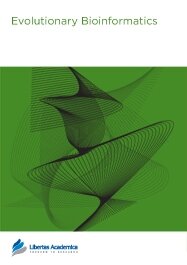

Publication Date: 24 May 2010
Type: Original Research
Journal: Evolutionary Bioinformatics
doi: 10.4137/EBO.S4528

The constant accumulation of sequence data poses new computational and methodological challenges for phylogenetic inference, since multiple sequence alignments grow both in the horizontal (number of base pairs, phylogenomic alignments) as well as vertical (number of taxa) dimension. Put aside the ongoing controversial discussion about appropriate models, partitioning schemes, and assembly methods for phylogenomic alignments, coupled with the high computational cost to infer these, for many organismic groups, a sufficient number of taxa is often exclusively available from one or just a few genes (e.g., rbcL, matK, rDNA). In this paper we address scalability of Maximum-Likelihood-based phylogeny reconstruction with respect to the number of taxa by example of several large nested single-gene rbcL alignments comprising 400 up to 3,491 taxa. In order to test the effect of taxon sampling, we employ an appropriately adapted taxon jackknifing approach. In contrast to standard jackknifing, this taxon subsampling procedure is not conducted entirely at random, but based on drawing subsamples from empirical taxon-groups which can either be user-defined or determined by using taxonomic information from databases. Our results indicate that, despite an unfavorable number of sequences to number of base pairs ratio, i.e., many relatively short sequences, Maximum Likelihood tree searches and bootstrap analyses scale well on single-gene rbcL alignments with a dense taxon sampling up to several thousand sequences. Moreover, the newly implemented taxon subsampling procedure can be beneficial for inferring higher level relationships and interpreting bootstrap support from comprehensive analysis.
PDF (2.08 MB PDF FORMAT)
RIS citation (ENDNOTE, REFERENCE MANAGER, PROCITE, REFWORKS)
BibTex citation (BIBDESK, LATEX)
XML
PMC HTML
Publishing in Air, Soil and Water and Water Research was the best experience I have had so far in an academic context. The review process was fair, quick and efficient. I congratulate the team at Libertas Academica for a very well managed journal.Magnus Karlsson (IVL Swedish Environmental Research Institute, Stockholm, Sweden) What Your Colleagues Say
Copyright © 2012 Libertas Academica Ltd (except open access articles and accompanying metadata and supplementary files.)
FacebookGoogle+Twitter
PinterestTumblrYouTube